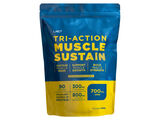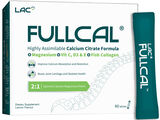Understanding Sarcopenia and The Importance of Protein

Many relate protein to building muscle or “bulking”, but it is also a major component of the skin, bones and tissues and is especially important for the elderly to preserve muscle mass. Read on to find out more!
What is Sarcopenia?
Sarcopenia is a condition that is characterized by loss of skeletal muscle mass and function.
Sarcopenia is most often seen in elderly adults and is characterized by progressive and generalized loss of skeletal muscle mass and strength.
Studies show that persons who live a mostly sedentary lifestyle with minimal exercise are at higher risks of losing more muscle mass and strength.
Not consuming sufficient protein and calories needed by the body, also contributes to loss of muscle and function.
Sarcopenia symptoms include:
- Muscle weakness
- Loss of stamina
- Lack of energy
- Poor neuromuscular function
- Frail bones
Resistance Training Exercise
It is recommended for seniors to stay active to keep their muscles working.
Strength and resistance training is found to be the most beneficial form of exercise to persons with sarcopenia as it improves muscle strength and stamina through the use of resistance bands and weights3.
Seniors who intend to embark on resistance training to improve their muscle strength and preserve muscle mass are recommended to consult certified fitness trainers or physiotherapists to work out a suitable fitness program.
Proper nutrition is also important for your exercises to be more effective.
As mentioned by Professor Samuel Chew, protein intake needs to increase with age and it can be synthesised more effectively with the addition of regular and moderate exercise4.
The Role of Protein in Maintaining Skeletal Muscle Mass and Strength
Several studies have identified protein (especially essential amino acids) as a key nutrient in maintaining and improving muscle heath in elderly adults5.
Protein can be found in foods such as lean meats and poultry, eggs, nuts, seeds, soy products, legumes and seafood. We need protein to:
- Build muscle strength
- Support muscle mass
- Build and maintain body tissues
- Promote healthy nerve and muscle function
- Burn calories and support metabolism
- Support enzyme production
1. “As I get older, I need to reduce my food intake”
While older adults might require lesser calories on the whole due to slowed down metabolism and reduced activity; seniors actually require more protein than younger adults in order to sustain and preserve their skeletal muscle mass and strength.
The right approach would be to consult with a dietician to determine the optimum amount of calories to consume per day and the optimum amount of protein as well as other nutrients that needs to come from daily diet in order for the body needs to stay healthy and functional.
It is important for seniors to choose nutrient-dense foods that contain fewer calories but provide more vitamins, minerals and important nutrients like protein.
To simply practice “indiscriminate” portion reduction or to entirely eliminate certain foods from one’s diet, this might cause malnourishment and under-nutrition that can lead to other undesired health conditions.
2. “Meat is too difficult to digest”
While red meat is not an ideal source of protein, lean meats like chicken, turkey and fish, tender cuts of pork tend to digest well. How the meat is cooked also has an effect on how easy it is to digest.
Instead of frying, try grilling, broiling, baking, steaming or poaching to help with easier digestion.
For non-meat lovers, other good sources of dietary protein can come from eggs, almonds, oats, milk, broccoli, lentils and Brussel sprouts.
3. “I need to avoid eating eggs after a certain age”
Many seniors tend to avoid eggs simply because eggs have been given a bad reputation due to the cholesterol content in yolks.
The truth is, eggs are probably one of the most nutritious food sources available to us.
Eggs are a good source of protein and contain a variety of nutrients such as Vitamin D, B6, B12, Selenium and other beneficial nutrients.
The commonly heard recommendation is to limit the consumption of egg yolks to 2 to 6 yolks per week. However actual scientific support for imposing this limitation is lacking.
In comparison, there have been studies conducted to examine the effects of eggs on cholesterol levels and found that eggs consistently raise HDL (the “good”) cholesterol.
It is also safe for healthy people to consume up to 3 whole eggs per day6.
Below are some other common and valid reasons why seniors might avoid taking protein-rich food:
- Weak digestive system causing uncomfortable symptoms such as bloating and nausea after meals
- Small or poor appetites
- Weakened sense of taste and smell
- Weak/ missing teeth which makes it difficult to chew and swallow
- Fear of affecting their liver and kidney health
Specially formulated to meet the protein needs of older adults, LAC Tri-Action Muscle Sustain provides an easy and convenient way for seniors to consume optimal levels of protein in the form of a delicious and easy to drink banana flavoured protein drink.
LAC Tri-Action Muscle Sustain helps to:
- Sustain Muscle Mass
- Support Muscle Growth
- Build Muscle Strength
Protect yourself and your loved ones against the debilitating effects of age-related skeletal muscle loss that can rob away independence, mobility and quality of life. Take the steps to fortify and preserve your muscle mass and strength today.
1 Losing muscle mass as we age: https://www.health.harvard.edu/staying-healthy/preserve-your-muscle-mass#:~:text=Age%2Drelated%20muscle%20loss%2C%20called,muscle%20mass%20during%20their%20lifetimes.
2,4,7 Tan, Cheryl, and Shabana Begum. “4 In 5 Elderly Singaporeans Who Are at Risk Of Malnutrition Have Low Muscle Mass: Study.” The Straits Times, 15 Jan. 2021, www.straitstimes.com/singapore/4-in-5-elderly-singaporeans-who-are-at-risk-of-malnutrition-have-low-muscle-mass-study#:~:text=SINGAPORE%20%2D%20Four%20in%20five%20Singaporeans,their%20muscle%20mass%20and%20strength .
3 Exercise for persons with sarcopenia: https://www.healthline.com/health/sarcopenia#treatment
5Protein Consumption and the Elderly: What is the Optimal Level of Intake: https://www.ncbi.nlm.nih.gov/pmc/articles/PMC4924200/
6 Cholesterol level and consumption of eggs: https://www.healthline.com/nutrition/how-many-eggs-should-you-eat#TOC_TITLE_HDR_3









